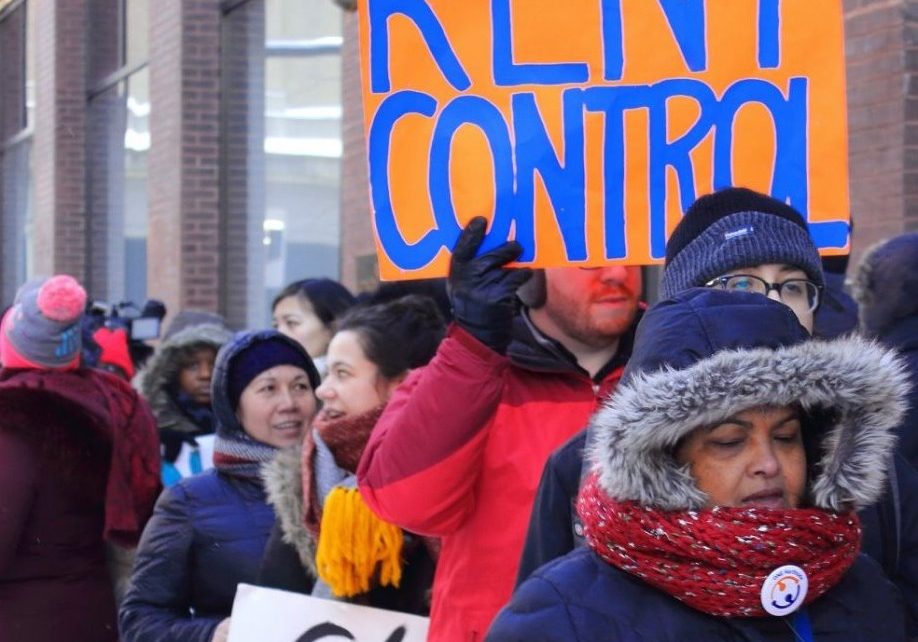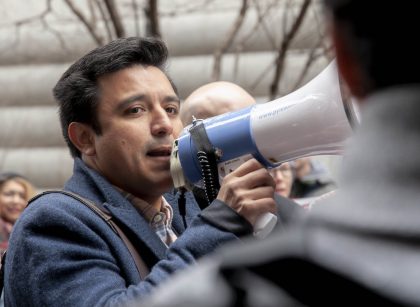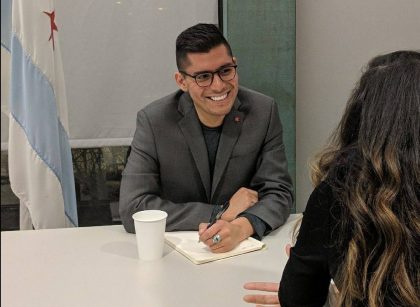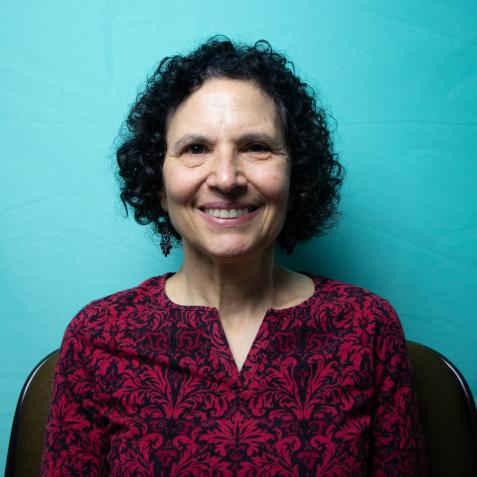
The pandemic has created tremendous disruption for Chicagoans, with mass lay-offs and health restrictions causing economic uncertainty for thousands of residents. Even with stimulus money no longer arriving, Gov. J.B. Pritzker has been going month-to-month in renewing a moratorium on evictions in Illinois. With legislative efforts stalled to either lift the ban on rent control or forgive the back-owed rent piling up, local organizers have tried to provide assistance for at-risk residents. Tenants’ rights coalitions have worked hard during the pandemic season to give tenants some sense of leverage and solidarity with which they can bargain for their future.
A network of hotlines and neighborhood groups has emerged over the past few months for the purposes of fielding questions from frightened tenants and bringing together residents who live in the same community or share a landlord. The Chicago Tenants Movement (CTM), which began in August, provides a hotline to help link residents to tenant unions and other forms of assistance.
Retired engineer Robin Semer, who helps with the hotline for the CTM, says that callers are often extremely upset. Educating them on their rights and potential options, Semer says that the role she plays is “to just calm them down to a certain degree so that they can move forward.” That could include connecting people with legal aid, mutual aid societies or interpreters.
Semer, who has owned a building herself for over 30 years, feels that while some landlords are vulnerable, many have used this time as an opportunity to push unwanted residents out illegally, or threaten them. Especially in minority communities, landlords will resort to tactics such as shutting off water or entering apartments unannounced, things often not permitted under the law or lease agreements.
Jose Almanza, the treasurer for Unete La Villeta, says that members have been trying to pass out fliers in Little Village to help educate tenants about their rights. “A lot of population is undocumented,” Almanza says. “So they just kind of take their [the landlord’s] word: ‘oh they have some kind of official status so maybe they are right.’”
In addition, Almanza says there is a lot of fear in the undocumented community, that they could give their name or information to the wrong people. Therefore, building trust is key. “They see me, a brown person, a fellow Latino that looks like them, they think maybe I can trust them,” Almanza says. Unete La Villeta is working on a pilot program with organizing tenants in 15 buildings, mostly along Kedzie Avenue, all owned by the same property manager.
“A big part of our mission is helping neighbors getting to know each other,” says Kathleen Roberts, an organizer with the North Spaulding Renters Association. “That is how neighborhoods actually function, stay safe, and how people get help when facing trouble.”
According to Roberts, the group was able to secure free rent for several dozen units at the start of the pandemic that were most at risk. The North Spaulding Renters were organizing tenants living in units owned by the same property management group, M. Fishman and Co., that owns 47 buildings spread out across the Logan Square and Humboldt Park area and has butted heads with tenants rights groups before, including over the issue of gentrification. The latter company has also fought with Alderman Carlos Ramirez-Rosa of the 35th Ward, engaging in a lease dispute and donating to his 2019 election challenger.
Ramirez-Rosa is one of six politicians in the Chicago City Council Socialist Caucus who have allied with tenants’ right groups in various campaigns during the pandemic. Unfortunately, the City Council is limited in what it can accomplish against the power of the mayor’s office, which has opposed a “just cause ordinance” that would have protected against unfair lease adjustments, and the Illinois state ban on rent control that was passed in 1997. Rep. Delia Ramirez, whose district includes Humboldt Park and other areas just west of I-90, introduced a bill in May that would have cancelled some rent and mortgage payments, but it didn’t get out of committee.
CTM Slams Mayor Lightfoot’s Support for Landlords
Ivy Abid, an organizer with the Chicago Tenants’ Movement a member of the Chicago chapter of the Democratic Socialists of America (CDSA), says that, politically, lifting the ban is a priority, and slammed the mayor’s Fair Notice Ordinance that was passed this summer as an ineffective tool. “Landlords can still do whatever the hell they want,” Abid says. “They just have to wait an extra month to do it.”
Abid co-created the database, “Find My Landlord”, which offers a map to help provide information for tenants about what other buildings their landlords own.
“We were seeing a constant narrative coming from real estate lobbyists and developers,” Abid says. “They say ‘we can’t have rent relief or cancel mortgages because most landlords are mom and pops and that would bankrupt everyone.’” The database helps “reveal the lie” about the corporate developers who own much of Chicago’s housing.
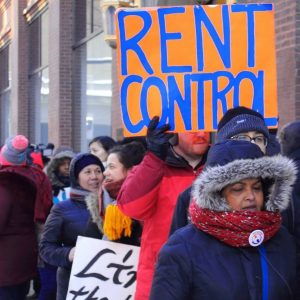
“If I’m a tenant and want to pressure my landlord by organizing my building,” Abid says, “wielding that leverage as a tenants union, it would be helpful to know what other tenants there are.”
A high school teacher, Abid also says she’s encountered many housing-related issues among students, including those who had to relocate during the pandemic because they couldn’t afford rent in Chicago, and even students rendered homeless in the middle of the school year. “We need to do as much as possible to make it impossible to exploit people’s living situations,” Abid says. “It is such an obvious human right … we need our students to be stable and housed.”
While the monthly moratorium extensions are better than nothing, there are still tenants falling through the cracks and the uncertainty over their future status remains. Abid says she’s been in assisting an unemployed restaurant server since April whose landlord delivers “like clockwork” an eviction notice set the day the moratorium expires. “This woman texts me every time,” Abid says. “She says, ‘hey I got a five day notice, what do I do? Do I need to move out? And I tell her, I ‘think’ it’s going to be extended … we are seeing a ton of intimidation and fear, using these informal mechanisms to push people and scare them.”
It’s also an open debate whether the moratorium protects individuals who were at risk before the pandemic began. The North Spaulding union has been trying to help one elderly woman with mobility issues, a holdout after her building had been remodeled, who Fishman and Co have been trying to evict since last October. Roberts says that despite pursuing a variety of legal ends, and “personally asking them to not be the villains”, the woman’s case has progressed to the point where the union is now trying to find her new housing.
Undocumented workers are constantly threatened, but even for many documented workers, this is a scary time. “I worked with someone who was having a flooding issue,” Roberts says. “They said they can’t leave [their flooded home] because if they don’t have an address, their visa is in jeopardy … they had to sublease a flooding apartment!”
The pandemic has exacerbated issues of inequality in Chicago, with the African-American and Latino communities in the South Side hit hardest. While some alderman and local politicians have been allies and advocates for their struggling constituents, other parts of Chicago have had to rely entirely on grassroots efforts. Almanza says that in the heavily Latino area of Little Village, the government hasn’t been helpful.
“Our politicians are a big roadblock to helping us,” Almanza says. “We held a rally where we invited local alderman. All they had to do was show up, and they didn’t, so that speaks to heir priorities.” Unete La Villita has also struggled to keep a food pantry open which started in May; the FDA cancelled a contract and they ran out of food boxes in September. Almanza says they have been able to keep it open via donations from the Chicago Park District.
Amidst the struggles and growth in union organizing, there have been some success stories. Abid says that one tenant who had been attending collective case work meetings on the north west side formed a union with other units in a building in Albany Park their landlord was trying to sell. All but one tenant was living there on an expired lease but the landlord couldn’t sell the property unless everyone was evicted. Together the residents were able to forestall eviction when their show of solidarity caused the buyer to retract their offer. “They have bought themselves a little bit of time,” Abid says. “They just want a year so they’re trying to get the landlord to reup the leases…that was such a cool, inspiring story!”
For the fourth month in a row, Gov. Pritzer extended the moratorium another 30 days on October 16. Throughout the US as a whole, approximately 80 percent of renters facing the threat of eviction by the end of the year are communities of color, primarily black and Latinx. Over 3,000 eviction cases in Cook County have been filed so far since the start of the pandemic. Nearly half of Latinx renters in Chicago owe back-rent; overall in Illinois it is estimated that as many as half a million homeowners could be at risk of eviction by the end of the year.
The Chicago Tenants Movement hotline can be accessed here.
- Amid Pandemic and Government Inaction, Chicago Tenants’ Rights Organizers Step Up - October 26, 2020
- Latino Caucus Members Push for Police Reform, Evictions Protection - August 26, 2020
- Carlos Ramirez-Rosa Leads the Latino Response to Coronavirus - April 20, 2020

